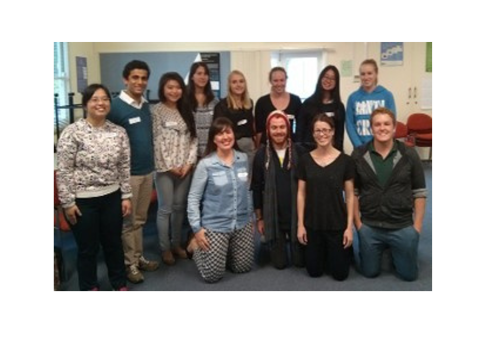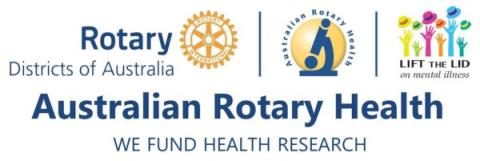Program Overview
Learn more about the Uni Virtual Clinic and how it was developed.
This platform is the latest version the Uni Virtual Clinic (UVC), an online mental health support program developed by ANU researchers. An earlier version of the UVC offered a wide range of resources, including detailed information, quizzes, and self-help therapeutic programs targeting various issues affecting university students, such as depression, anxiety, stress, procrastination, and perfectionism.
In 2019 we streamlined the program into 12 short videos containing practical tips and strategies to help students support their mental health while at university.
It’s been created with direct input from students. Through focus groups, surveys, and hands-on testing, students have played a key role in shaping the clinic to make sure it meets their needs.

The Uni Virtual Clinic (UVC) was created through a series of collaborative research and development stages, involving input from young people, university stakeholders, and service providers.
The development began with an initial scoping stage to establish a service model tailored for a university setting. This phase included systematic reviews, surveys, and focus groups with staff and students. In the second stage, a prototype of the UVC was developed and underwent iterative cycles of user testing and redevelopment. Students tested the prototype, and their feedback was incorporated into the program. The third stage involved software implementation and graphic design. A Student Leadership Group (pictured right) also provided valuable input into the design during this phase. The UVC was officially launched in 2016 and was subsequently tested in a randomised controlled trial with ANU students in 2017/2018.
In 2019, the program was re-developed into a briefer, more streamlined version, based on student feedback from the first trial of the program at ANU. The content from the original UVC program was condensed into 12 brief videos, with accompanying exercises and quizzes. This version of the program was tested in a randomised controlled trial with students from all across Australia from 2020-2023.
The Uni Virtual Clinic team have conducted a comprehensive program of research related to the development and evaluation of the program since 2012. See below for a list of research publications associated with the program:
Publication on student experiences with the UVC-Lite program
Jackson, H., Gulliver, A., Hasking, P., Leach, L. S., Batterham, P. J., Calear, A. L., Farrer, L. M. (2024). Exploring student preferences for implementing a digital mental health intervention in a university setting: Qualitative study within a randomised controlled trial. Digital Health. Accepted 5/8/2024.
Publication on the outcomes of the national UVC-Lite RCT
Farrer, L. M., Jackson, H., Gulliver, A., Calear, A. L., Keach, L., Hasking, P., Katruss, N., Batterham, P. J. (2024) A transdiagnostic video-based online intervention to improve the mental health of university students: Randomized controlled trial of the Uni Virtual Clinic-Lite. J Med Internet Res, Accepted 25/5/2024.
Publication on the development of the Uni Virtual Clinic
Farrer, L.M. ,Gulliver, A., Katruss, N., Bennett, K., Bennett, A., Ali, K., & Griffiths, K.M. (2020) Development of the Uni Virtual Clinic: an online programme for improving the mental health of university students, British Journal of Guidance & Counselling, 48(3), 333-346, doi: 10.1080/03069885.2020.1729341
Publication on the outcomes of the Uni Virtual Clinic RCT
Farrer, L.M., Gulliver, A., Katruss, N., Fassnacht D.B., Kyrios M., & Batterham P.J. (2019). A Novel Multi-Component Online Intervention to Improve the Mental Health of University Students: Randomised Controlled Trial of the Uni Virtual Clinic. Internet Interventions, 18. doi: 10.1016/j.invent.2019.100276
Publication on university staff experiences with student mental health problems
Gulliver, A., Farrer, L., Bennett, K., Ali, K., Hellsing, A., Katruss, N., & Griffiths, K.M. (2018). University staff experiences of students with mental health problems and their perceptions of staff training needs. Journal of Mental Health, 27(3), 247-256. doi: 10.1080/09638237.2018.1466042
Publication on university staff mental health literacy and stigma
Gulliver, A., Farrer, L., Bennett, K., & Griffiths, K.M. (2017). University staff mental health literacy, stigma and their experience of students with mental health problems. Journal of Further and Higher Education, 1-9. doi: 10.1080/0309877X.2017.1367370
Farrer, L. M., Gulliver, A., Bennett, K., Griffiths K. M., & Fassnacht, D. (2016). Demographic and psychosocial predictors of major depression and generalised anxiety disorder in Australian university students. BMC Psychiatry, 16, 241. doi: 10.1186/s12888-016-0961-z
Publication on the Uni Virtual Clinic co-design development process
Gulliver, A., Farrer, L. M., Bennett, K., Bennett, A., Griffiths, K. M. (2016). The Uni Virtual Clinic: changing the way mental health care is provided to young people at university. Young and Well Cooperative Research Centre and The Australian National University. Submitted to the Analysis & Policy Observatory.
Publication on university students' views on help-seeking on the internet
Chan, J. K. Y., Farrer, L., Gulliver, A., Bennett, K., & Griffiths, K. M. (2015). University students’ views on the perceived benefits and drawbacks of seeking help for mental health problems on the Internet: A qualitative study. JMIR Human Factors, 3(1): e3. doi: 10.2196/humanfactors.4765
Farrer, L.M., Gulliver, A., Bennett, K., & Griffiths, K.M. (2015). Exploring the acceptability of online mental health interventions among university teaching staff: Implications for intervention dissemination and uptake. Internet Interventions, 2(3), 359-365. doi: 10.1016/j.invent.2015.07.006
Systematic review on online peer support for young people with mental health problems
Ali, K., Farrer, L.M., Gulliver, A., & Griffiths, K.M. (2015). Online peer-to-peer support for young people with mental health problems: a systematic review. JMIR Mental Health, 2(2): e19. doi: 10.2196/mental.4418
Publication on privacy issues and considerations in the development of the UVC
Gulliver, A., Bennett, K., Bennett, A., Farrer, L.M., Reynolds, J., & Griffiths, K.M. (2015). Privacy Issues in the Development of a Virtual Mental Health Clinic for University Students: A Qualitative Study. JMIR Ment Health, 2(1), doi: 10.2196/mental.4294.
Publication on student needs and priorities for a virtual mental health clinic
Farrer, L.M., Gulliver, A., Chan, J.K., Bennett, K., & Griffiths K.M. (2015). A Virtual Mental Health Clinic for University Students: A Qualitative Study of End-User Service Needs and Priorities. JMIR Mental Health, 2(1). doi: 10.2196/mental.3890.
Gulliver, A., Farrer, L., Chan, J.K.Y., Tait, R., Bennett, K. Calear, A.L. & Griffiths, K. M., (2015). Technology-based interventions for tobacco and other drug use in tertiary students: A systematic review and meta-analysis. Addiction Science & Clinical Practice, 10: 5. doi: 10.1186/s13722-015-0027-4
Systematic review of technology-based interventions for university students
Farrer, L.M., Gulliver, A., Chan, J. K., Batterham, P. J., Reynolds, J., Calear, A., Tait, R., Bennett, K. & Griffiths, K. M. (2013). Technology-based interventions for mental health in tertiary students: systematic review. Journal of Medical Internet Research, 15(5). doi: 10.2196/jmir.2639
Funding for the development of the original Uni Virtual Clinic program was provided by:

Funding for the RCT evaluation of the Uni Virtual Clinic was provided by:

Funding for the national RCT of the UVC-Lite program was provided by:
